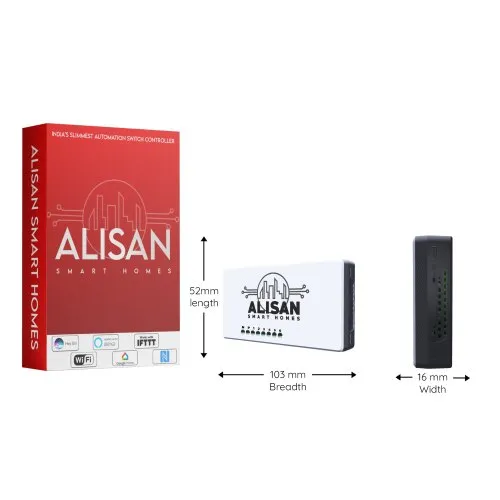Alisan Hybrid 6 Switch Controller, Wireless
₹7,500.0
| Brand |
Alisan Smart Homes
|
| Connectivity |
Wireless
|
| Dimension (lxbxh) |
103x52x16 mm
|
| Operating distance from Wi-Fi router |
up to 30 meters* (depending upon router and its placement)
|
| No of Channels |
6
|
Alisan Hybrid 6 Switch Controller:
In the era of environmental consciousness, eco-friendly smart home products emerge as beacons of sustainable living. These innovative technologies seamlessly integrate into our daily lives, contributing to a greener and more energy-efficient future.
To commence this journey towards eco-conscious living, smart thermostats take center stage. These devices actively monitor and regulate home temperatures, optimizing energy consumption and reducing overall carbon footprints. With intuitive features, they adapt to occupants’ preferences, ensuring comfort while minimizing energy wastage.
Transitioning to lighting solutions, smart LED bulbs illuminate homes with both efficiency and elegance. These bulbs boast energy-efficient technology, consuming significantly less power than traditional counterparts. Moreover, their smart capabilities allow for remote control, scheduling, and customization, ensuring a tailored and eco-friendly lighting experience.
The realm of smart home products extends to water conservation with the advent of smart faucets. These fixtures employ sensor technology to deliver water precisely when needed, minimizing waste. Additionally, they often come equipped with features like temperature control and leak detection, contributing to resource efficiency.
In the domain of waste management, smart bins revolutionize the disposal process. Equipped with sensors, these bins automatically open upon detecting motion, facilitating hands-free and hygienic waste disposal. This not only enhances convenience but also reduces unnecessary waste generated from single-use plastic bags.
Alisan Hybrid 6 Switch Controller: The integration of renewable energy sources characterizes eco-friendly smart homes. Solar panels, coupled with smart inverters, harness sunlight to generate electricity efficiently. These systems not only decrease reliance on traditional power grids but also enable homeowners to contribute excess energy back to the grid.
In conclusion, the synergy between eco-friendly and smart home products ushers in a new era of sustainable living. From energy-efficient thermostats to waste-reducing smart bins, these innovations redefine our relationship with the environment, showcasing that technology and sustainability can coexist harmoniously for a greener tomorrow.
You must be logged in to post a review.
Q & A
Comparing the sustainability of smart home products to conventional (non-smart) products involves examining various factors related to their environmental impact throughout their lifecycle. Here's a comparison of these two categories: 1. Energy Efficiency: - Smart Home Products: Many smart home devices are designed with energy-efficient features, such as sensors that can automatically adjust settings based on occupancy and usage patterns. This can lead to reduced energy consumption compared to conventional products. - Conventional Products: Traditional appliances and devices may lack these energy-saving features, leading to higher energy consumption over time. 2. Materials and Manufacturing: - Smart Home Products: Some smart home products are designed with sustainable materials, and manufacturers are increasingly incorporating eco-friendly practices into their production processes. - Conventional Products: Conventional products may use less sustainable materials and may not prioritize eco-friendly manufacturing processes. 3. Longevity and Durability: - Smart Home Products: Sustainability is often a priority for smart home manufacturers, leading to the creation of durable and longer-lasting products that are less likely to require replacement. - Conventional Products: Durability varies among conventional products, and some may need replacement or repair sooner, contributing to greater waste. 4. Resource Consumption: - Smart Home Products: Smart devices may require additional resources like rare earth metals for their components, but their efficient use can offset this impact. - Conventional Products: Traditional appliances may also require significant resources in their production but may not have the same level of resource-efficient operation. 5. Connectivity: - Smart Home Products: Interconnectivity among smart devices can optimize resource usage by coordinating activities like heating, cooling, and lighting based on real-time data. - Conventional Products: Conventional products may not have the capability to coordinate and optimize resource usage to the same extent. 6. End-of-Life Disposal: - Smart Home Products: Some smart devices are designed with easier recycling or repurposing in mind, reducing the environmental impact at the end of their lifecycle. - Conventional Products: Disposal options for conventional products may vary, and they may contribute to more electronic waste. 7. Software Updates: - Smart Home Products: Regular software updates can enhance the functionality and security of smart devices, potentially extending their useful life. - Conventional Products: Traditional products typically do not receive software updates to improve functionality. 8. Data Privacy and Security: - Smart Home Products: Ensuring data privacy and security is essential to prevent unauthorized access and data breaches, which can lead to early obsolescence. - Conventional Products: Data privacy and security may be less of a concern for conventional products. Overall, the sustainability of smart home products and conventional products depends on various factors, including design, manufacturing, usage, and disposal practices. While smart home products have the potential to be more sustainable due to their energy-efficient features and connectivity, the specific environmental impact can vary widely between individual products and brands. Therefore, it's essential to consider these factors on a case-by-case basis when making purchasing decisions based on sustainability concerns.
General Inquiries
There are no inquiries yet.




Reviews
There are no reviews yet.